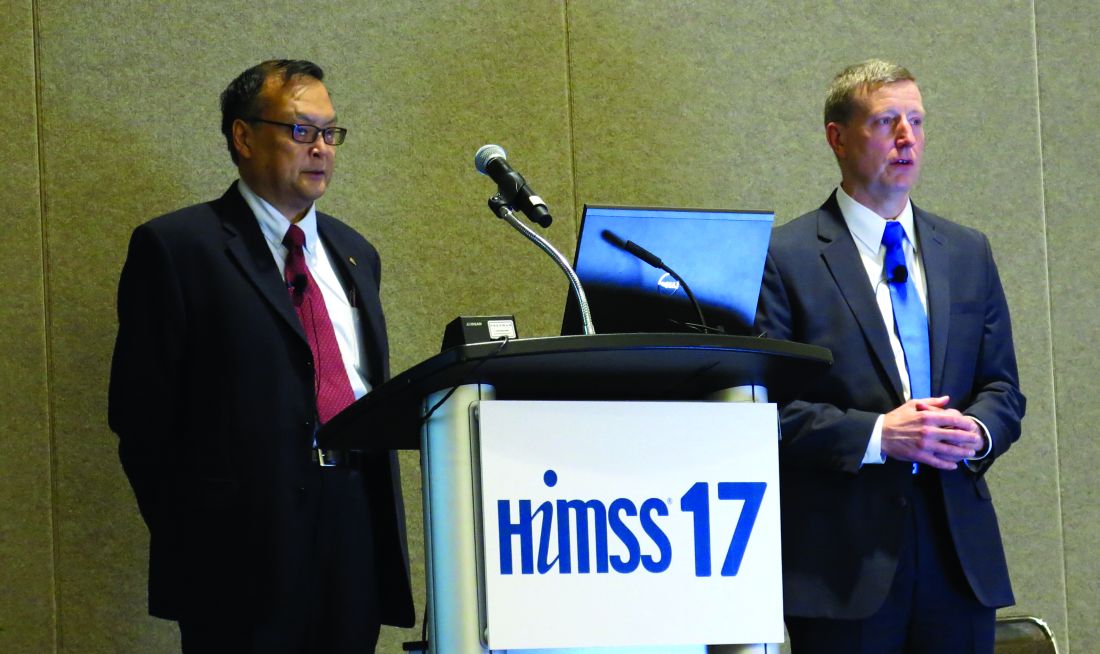ORLANDO – Early evidence suggests that OpenNotes is helping to engage patients and improve health outcomes while not creating undue burden for physicians.
A 2010 pilot project at Beth Israel Deaconess Medical Center in Boston, Geisinger Health System in Pennsylvania, and Harborview Medical Center in Seattle tested OpenNotes, a program that allows patients to see the entirety of a physician’s notes within their medical record and not just a summarized version.
Homer Chin, MD, of the department of medical informatics and outcomes research at Oregon Health & Science University, Portland, an associate with the OpenNotes Program, and physician champion for the Northwest OpenNotes Consortium, noted that a survey of the 105 primary care physicians participating in the pilot revealed they were apprehensive when they heard their visit notes would be completely available to patients.
Prior to the launch of the pilot, 24% of physicians expected significantly longer visits because of the availability of OpenNotes, 42% said they expected to spend more time addressing patient questions outside of visits, and 39% said they expected to spend more time writing/editing/dictating notes, Dr. Chin said at the annual meeting of the Healthcare Information and Management Systems Society.
Their concerns never quite materialized.
According to a survey of the participating physicians after the yearlong pilot, only 2% reported visits took significantly longer, 3% said they spent more time addressing patient questions outside of visits, and 11% said they spent more time writing/editing/dictating notes.
With regard to writing notes, “what we are finding is that most physicians are saying they are changing the way they write the note a little bit, but it is not taking more time,” Dr. Chin said. “They are just watching for certain terms and writing them in a different way, but it is not necessarily taking more time.”
More than 70% of patients who participated in the trial reported they are taking better care of themselves, more than 77% said they have a better understanding of their medical condition, more than 69% said they are better prepared for visits and more than 60% said they are more adherent to their prescription medication regimens.
Importantly, 85% said the availability of OpenNotes would affect their future choice of providers.
Dr. Chin also discussed the results of a survey of patients using OpenNotes in the Virginia Commonwealth University Health System in Richmond, noting that of roughly 420 respondents, 70% said their contact with their providers did not change, with nearly 20% saying they were contacting their provider less. Just over 40% said that reading their notes made them less worried about something health related, while a little more than 50% said there was no change. Nearly 85% said they thought seeing the notes helped them take better care of themselves. Nearly 90% of patients said that they understood some or all of their doctors’ notes.
It has been incredibly valuable “when the patients use the portal to prepare themselves for the visit with the provider,” Mr. Kravitz said. “They will review their case. They’ll look at past x-rays or reports, any kind of information, the results for laboratory and anything else, but they will message their provider. They are very heavy into messaging. It’s secure messaging within the portal and any type of questions, especially after they’ve had an appointment, they’ve thought of something they didn’t think about in the appointment, they have the opportunity to message back to the provider’s office.”
Geisinger saw 620,000 encounter reviews in OpenNotes out of 2 million patient visits in its last fiscal year, with virtually no complaints about the information in the OpenNotes.
Dr. Chin stressed that the implemented OpenNotes needs to be driven by physicians.
“I would emphasize that this has to be a clinician operational leader supported effort, and not an IT effort, so that when clinicians complain, you can point them to their department head, the chief medical officer, and not the IT people,” he said. “You’ve got to have good communication to providers. Our advice is to start with one department. You might do a pilot for a very short period of time, but there is enough evidence now to really implement it throughout the organization. We encourage people not to allow individual providers to opt out on their own, to make their own decision to opt out, to do it as an organizational effort.”
Michael Day, chief information officer of Ascension Health and Columbia St. Mary’s Health System of Milwaukee, offered the same advice.
“You’ve got to have leadership commitment up front,” Mr. Day said. “This really has to have good, strong physician leadership. The key executive in charge of all of this was the president of our medical group which drove a lot of the change with a lot of support from other areas.”
He noted that at his organization there was “a lot of physician grumbling” when OpenNotes was announced. However, there has been “relatively no impact. I think they’ve all agreed that this has made care better. We’ve also seen an actual improvement in the quality of the documentation.”
None of the presenters reported any conflicts of interest.


